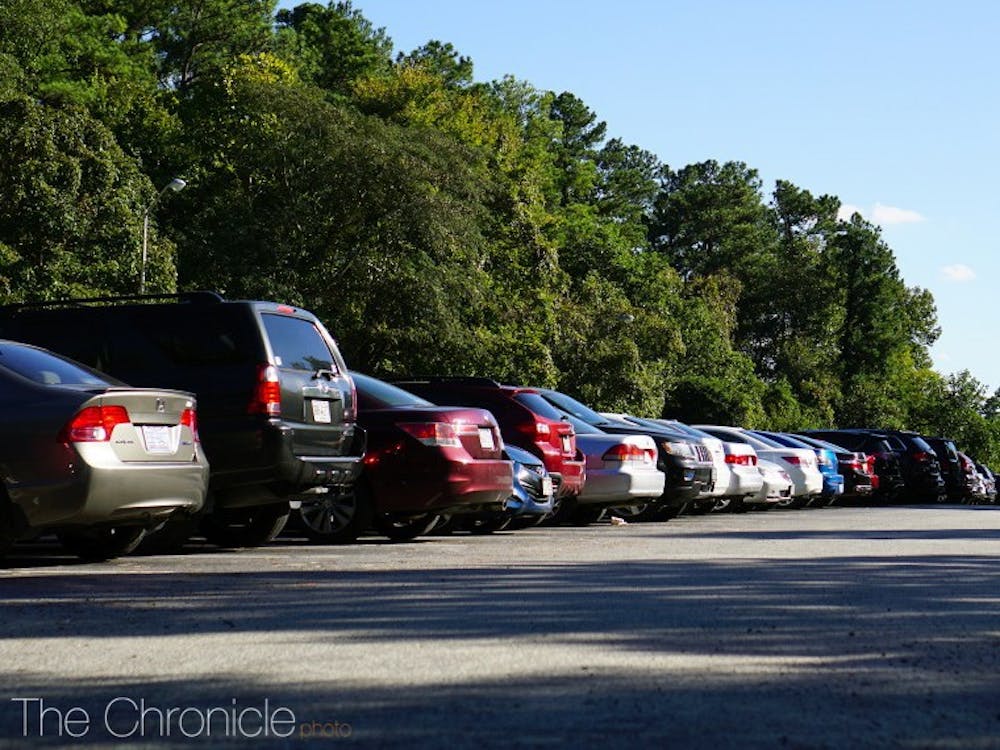Editor’s note: Do you have concerns about parking on campus that you would like to share with The Chronicle? Email Managing Editor Nathan Luzum at nathan.luzum@duke.edu if you are interested in sharing your experience for future reporting.
Students aren’t the only ones who have an axe to grind with parking—staff and faculty members from across Duke have expressed frustration with Parking and Transportation Services.
The director of Duke’s Triangle Universities Nuclear Laboratory and several workers in the Duke University Health System voiced issues with parking, ranging from steep prices, availability on campus and potential safety concerns. Carl DePinto, director of Parking and Transportation Services, did not respond to multiple requests for comment on this story.
TUNL is not happy with Duke’s parking department. Although the lab has sent multiple complaint emails, TUNL Director Art Champagne said the problems just don’t seem to be fixed.
“They are making it really hard for us to do our work,” he told The Chronicle.
He explained that TUNL has had ongoing disputes with Duke’s parking department for a few years, describing the problem as “multi-dimensional.”
The first dimension is cost. Since 2016, Champagne said the price of the daily pass for parking has doubled from $5 to $10. The lab’s research grant has also gone up, but not nearly at the same rate. In 2018, $24,000 of the lab’s expenses were spent on parking, and that number rose to a record high of $30,000 in 2019.
“That’s money I’m not spending on research,” Champagne said. “I don’t see what the justification is. They’re gouging me.”
A U.S. Department of Energy Center of Excellence, TUNL works at the frontier of nuclear physics. It was established in the 1960s by Duke, North Carolina Central University, North Carolina State University and the University of North Carolina at Chapel Hill. Projects in the lab range from investigating stars through nuclear synthesis to examining the properties of neutrinos.
He added that the problem with parking becomes worse during football season, when parts of the campus are closed off and drivers are required to purchase checkpoint passes.
Sometimes, Champagne alleged that the parking staff members “don’t honor the checkpoint passes,” preventing staff from accessing an accelerator, a key tool for their research. An accelerator failed in September 2018, and Champagne noted that its supervisor was turned away by parking staff. Due to the delay in maintenance, an experiment had to be shut down.
“That’s just not acceptable,” he said. “We need to be able to get in there to do our work. I don’t care if it’s football… Let’s get our priorities in order. I’m sure that other people who want to work during football season have the same issue that we do.”
Champagne also worried about the safety of his graduate students. Due to limited parking space, most of them need to park in the Smith Warehouse Lot and walk 7/10 of a mile to where the accelerator is located. The accelerator operates 24 hours a day, he explained, meaning some students must walk long distances at night.
He mentioned he no longer has an optimistic attitude toward parking issues.
“There’s no way to win against parking,” Champagne said. “I’ve dealt with this at other universities, too. We complain and we feel good about it, but no one wins.”
Heather Kuehn, a regulatory coordinator at the Duke University Medical Center, also had complaints against parking. Kuehn and her colleagues pay to park in the Graduate Center lot, located near the intersection of Erwin Road and Flowers Drive.
In September, around 60 parking spaces were reallocated to the GC lot due to construction. Due to the reconfiguration, Kuehn now has to park in the H section, which is farther back past the internal parking gate and bordered by Erwin Road and Anderson Street.
Kuehn thinks it is unfair to park in the H section but still pay the prices of the GC lot. In addition, she received a ticket for parking in the newly allocated spaces prior to when markings were drawn. Since then, Kuehn said she has sent multiple emails to the parking department without receiving a desirable response.
“The parking department can kill employee morale,” Kuehn said. “Many of my colleagues are completely frustrated with employee parking.”
Noely Martinez Overby, a clinical research coordinator at the Duke University Medical Center, said she feels the same way. Overby has worked at Duke for four years, one as a medical assistant and three as a researcher.
Before this year, Overby has had to park in the Erwin Mill parking lot on Ninth Street. Her options were to either take a shuttle or walk for 20 minutes to get from the parking lot to her office. Now, she parks in the GC lot, which is much closer to her office, and still pays the same amount.
She argued that it is unfair that the fee for both parking lots is the same, especially since the Erwin Mill lot did not even have a gate.
Like Kuehn, Overby has had to park in the H section of the GC lot after spots were allocated to provide alternative parking for other parking lots. She usually needs to drive around for a while before she can find a spot. One morning, she was unable to find any empty spot and had to call Parking and Transportation Services, which sent the Duke University Police Department to resolve the issue.
“I feel like Duke should appreciate their employees more,” Overby said. “They focus a lot on taking care of the students, but don’t care enough about the employees. Parking is just one part of that.”
Get The Chronicle straight to your inbox
Signup for our weekly newsletter. Cancel at any time.

